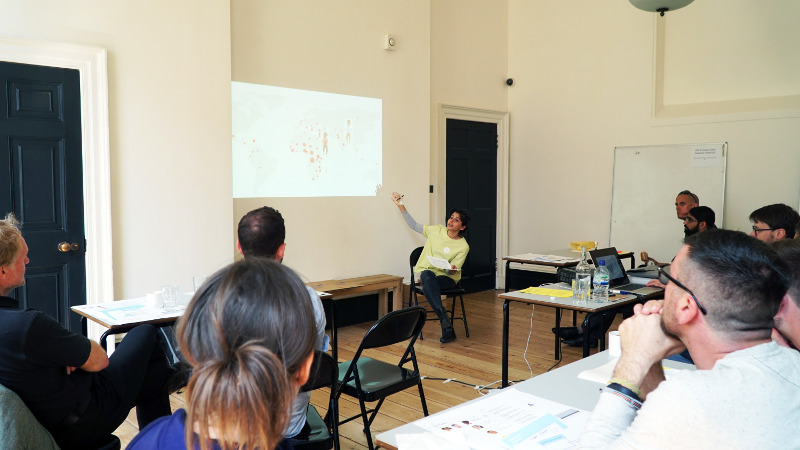We are a team of 2 based at Makerversity, London since 2017.

Shruti Grover, Human Centred Designer/Researcher
Shruti is a Human Centred Designer/Researcher who has led the conception, research, design and delivery of innovative products and services for King’s College London, Wellcome Trust, Médecins Sans Frontières, Stannah Stairlifts, Proteus Digital Health, Chelsea and Westminster Hospital, Cerestim Therapeutics, Ford, Rio Tinto and the Seoul Design Foundation.
She has led projects in the United States, India, Ethiopia, Kenya, Mozambique, Netherlands and the United Kingdom. She holds an MA/MSc (Dist) in Innovation Design Engineering from the Royal College of Art and Imperial College.

Simon Johnson, Data Scientist
Simon has worked in the data visualisation, open data and data science communities for the last 7 years supporting organisation such as the United Nations, International Federation of Red Cross Societies (IFRC), Chatham House, Médecins Sans Frontières and the World Food Programme.
He has extensive experience creating and managing software development projects to enable the use of data in humanitarian, development and health settings. In a previous life, Simon designed computer games and also worked as an actuarial consultant.
Writings
Selected Articles
Tool: Python Script for 1st Level Coding of Semi-Structured Interviews
HDX Universe: The shape of the Humanitarian Data Exchange
Internet of Things buttons for humanitarian response
Humanitarian Technology Hype 2018
HDX Universe: The shape of the Humanitarian Data Exchange
Growing the Humanitarian Exchange Language (HXL) ecosystem
Enter the hashtags — A story of user centred design and the Humanitarian Exchange Language (HXL)
Conference Papers and Posters
Identifiable Attributes of Balance
Grover, S., Johnson, S., Atkin, R., & Chris McGinley. (2016). Identifying attributes of “Balance Health” measurable using a smartphone application. In 8th Cambridge Workshop on Universal Access and Assistive Technology. Fitzwilliam College, University of Cambridge.
Actionable Visualizations
Grover, S., Johnson, S. (2017) Co-designing Visualisations Using Real Participant Data for a Body Balance Application, Presented at Mobile HCI, Vienna
Grover, S., Johnson, S., Atkin, R., & Johnson, S. (2016). A user centred approach to developing an actionable visualisation for “balance health.” Presented at the Design Research Society, Brighton.
Gamified Diagnostics
Shruti Grover. (2016). Designing a gamified, ability-appropriate diagnostics and training program. Presented at the 2nd Behaviour Change Conference: Digital Health and Wellbeing, UCL, February 2016, University College London.
Human Centered Methodology
Shruti Grover, & Ross Atkin. (2015). Using a Human Centered Methodology for Design of a Balance Application. Presented at the Behaviour Change Conference: Digital Health and Wellbeing, University College of London.
Quant-Qual Tool Dyads
Grover, S., Atkin, R., & McGinley, C. (2015). Certainty as a Provocation : The Design and Analysis of 2 Quant Qual Tool Dyads for a Qualified Self Technology Project. Presented at the Research Through Design, Cambridge.
Workshop Design
Design Provocations, conducted as Associate to Dr. Dan Lockton
Design Research Society Conference 2014, Umea
Social Design with Rama Gheerawo
Hamid Bin Khalifa University, Qatar
Inclusive Design for the Boardroom with Rama Gheerawo
Norway European Innovation Workshop
Exhbitions
Include 2015, Helen Hamlyn Centre for Design
London Design Festival, United Kingdom 2015
Research Through Design
Microsoft Cambridge, United Kingdom 2015
Here Today, International Union for Conservation of Nature
The Old Sorting Office, United Kingdom, 2014
Breaking Through, Helen Hamlyn Centre for Design
London Design Festival, United Kingdom 2014
Sustain RCA, Royal College of Art
London Design Festival, United Kingdom 2013
Show RCA, Royal College of Art
United Kingdom 2013
Goglobal, Seoul Design Foundation
South Korea 2012
30 Years of IDE
Imperial College London, 2012